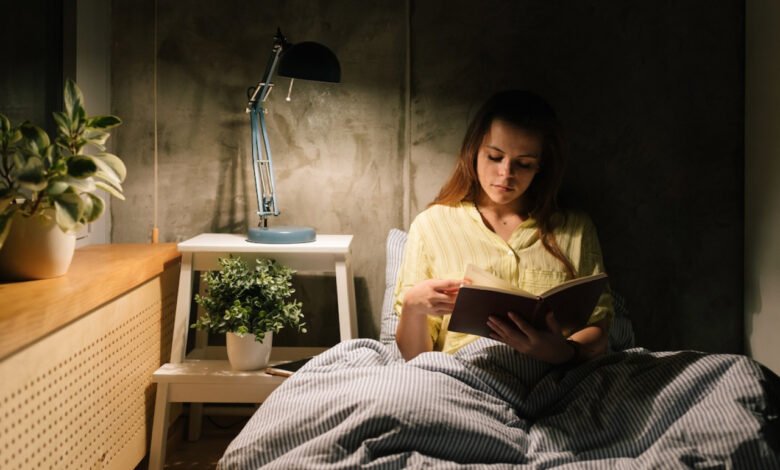How to Hack Your Bedtime Routine for Better Sleep

Missing out on the benefits of a solid bedtime routine? Keep reading for expert-vetted pre-ZZZ tips and habits that are sure to help you sleep more soundly.
If you struggle with getting enough quality sleep each night, you’re far from alone. In fact, more than one in three Americans aren’t getting their fair share of shut-eye, according to data from the Centers for Disease Control and Prevention (CDC). We know that sleep is crucial for our overall health and wellness, playing a pivotal role in how we think, feel and act. Sleep may even play a role in helping you maintain a healthy weight, according to a study published in the journal Obesity Research & Clinical Practice (ORCP).
For many, the trouble with sleep begins with the difficulty surrounding actually falling asleep. “To fall asleep, we need to trigger the switch in our brain that goes from adrenaline mode, called the sympathetic nervous system, to a calm state, called the parasympathetic nervous system,” explains Jacob Teitelbaum, MD, a board-certified internist and the author of From Fatigued to Fantastic! “Unfortunately, this is not something we can force—rather it is something that needs to be allowed and supported.”
While we might not be able to manually shift our brain into sleep mode, we can encourage it to quiet down and prepare for sleep by sticking to a calming bedtime routine.
The Importance of a Bedtime Routine
We often think of a bedtime routine as something reserved for young children. But everyone—from children to older adults—can benefit from better sleep, and sleep hygiene is a key factor in achieving that goal, notes Sunjya Schweig, MD, founder and director at the California Center for Functional Medicine.
“Good sleep hygiene supports the immune system, as sleep is your body’s first line of defense against infectious disease,” he says. “During sleep, your immune system releases immune-signaling molecules called cytokines that not only promote sleep, but also work to fight infections, inflammation, or stress.”
Winding down before bed also helps reduce the time it takes to fall asleep, which can be helpful for many. According to the Sleep Foundation, it takes an average of 10 to 20 minutes to fall asleep. This number should not be discounted, as a sleep latency (the time it takes to fall asleep) of fewer than eight minutes indicates increased sleepiness and sleep deprivation, or poor sleep in general, notes Dr. Schweig. “In contrast, sleep latency longer than 20 minutes can indicate insomnia or other factors that interfere with your ability to fall asleep,” he says.
How to Hack Your Bedtime Routine for Better Sleep
Whether you’re dealing with bouts of poor sleep or are simply looking to improve your sleep hygiene, adopt one, some, or all of these pre-bedtime habits that experts say can help you fall asleep with ease.
1. Exercise Earlier in the Day
It’s not always possible to fit in a workout in the morning, but doing so may help you be more alert during the day and help you doze off more easily at night, according to a study published in the Journal of Physiology.
Whether you’re not a morning person or simply don’t have time in your schedule to carve out 30 minutes to an hour of exercise in the a.m., Dr. Teitelbaum recommends avoiding any workouts within the two-hour time period before you plan to go to bed. Doing so triggers an adrenaline release, which is stimulating and can interfere with your ability to fall asleep, he notes.
2. Take a Warm Shower or Bath
A warm bath or shower not only feels calm and relaxing, but can help you drift off to sleep more quickly, according to a study published in the journal Sleep Medicine Reviews. If you’re a bath person, Dr. Teitelbaum suggests drawing yourself one within an hour before you plan to fall asleep, and adding a cup or two of Epsom (magnesium) salts and some lavender oil. “Do this about 60 minutes before bedtime as it relaxes muscles and triggers calming,” he says. “Then wrap in a comfortable robe and read or [do] something relaxing.”
3. Avoid Bright Lights
Try to keep away from bright lights, which can hinder the production of melatonin, warns Dr. Schweig. “Only use as much artificial lighting as is necessary for you to move safely around your home, especially between the hours of 10 p.m. and 4 a.m.,” he says. When selecting lighting for your home, Dr. Teitelbuam suggests opting for bulbs with a low Kelvin rating of up to 3,500K, as these tend to be more warm or red as compared to the blue tones that accompany Kelvin ratings of 5,000K and higher.

4. Limit Screen Time
The blue spectrum of screens (including your TV, tablet, and even many e-books) tends to stimulate adrenaline. “Many of our computer screens emanate ‘blue light,’ which depresses the pineal glands’ secretion of melatonin, the ‘sleep’ hormone,” according to Robert Hamilton, MD, FAAP, pediatrician at Providence Saint John’s Health Center in Santa Monica, California and host of the podcast The Hamilton Review: Where Kids and Culture Collide.
If you’re someone who’s gotten in the habit of falling asleep with the TV on, consider shutting it off about an hour before bed and opting instead for an auditory meditation or relaxing music.
5. Finish Dinner Well Before Your Bedtime
When you eat may impact how well you sleep. In fact, one study published in the British Journal of Nutrition found that eating or even drinking within an hour of falling asleep could have a negative impact on your sleep quality. “Just like our sleep clock, the body has a gut and liver clock,” explains Dr. Schweig.
“The body is less sensitive to insulin in the evening or at night, which controls blood sugar levels, therefore varying blood sugar levels can impact the quality of sleep,” he continues. He recommends finishing all meals ideally two to three hours before you want to fall asleep.
6. Try Sleep Supplements
Melatonin is the most popular option when it comes to sleep supplements. “Melatonin is a hormone that your brain produces in response to darkness and helps the timing of your circadian rhythms (24-hour internal clock) and with sleep,” explains naturopathic doctor and clinical nutritionist David Friedman, ND, DC.
While the body naturally produces melatonin, there are also supplements you can take to help you boost melatonin levels, including HUM Nutrition’s Beauty zzZz. It contains three milligrams of melatonin along with vitamin B6 and calcium, all of which work together to support quality sleep.
7. Practice Mindfulness
Engaging in mindfulness or any act that helps you become aware mentally, emotionally and physically—such as meditation, breathwork, journaling, or massage—helps stimulate the parasympathetic nervous system, explains Dr. Schweig. “Many people experience stress right before going to bed, but incorporating relaxing and mindful-oriented acts prior to falling asleep can help ease thoughts, worries, and encourage restfulness,” he says. He recommends trying a guided 10-minute sleep meditation, which you can find on YouTube or any number of meditation apps.
8. Go to Bed at the Same Time Each Night
Consistency is key to yield results from any regimen, but this rings especially true for your bedtime routine. Your body naturally adjusts to waking and sleeping at certain times. If you lack consistency in this area, you might have a harder time falling asleep on any given night, notes Dr. Schweig. This has to do with your body’s circadian rhythm; it also informs why we experience jet lag when we are in a different time zone than we are used to. For optimal shut-eye, aim to wind down within the same 30-minute period each night.
Source link
#Hack #Bedtime #Routine #Sleep



